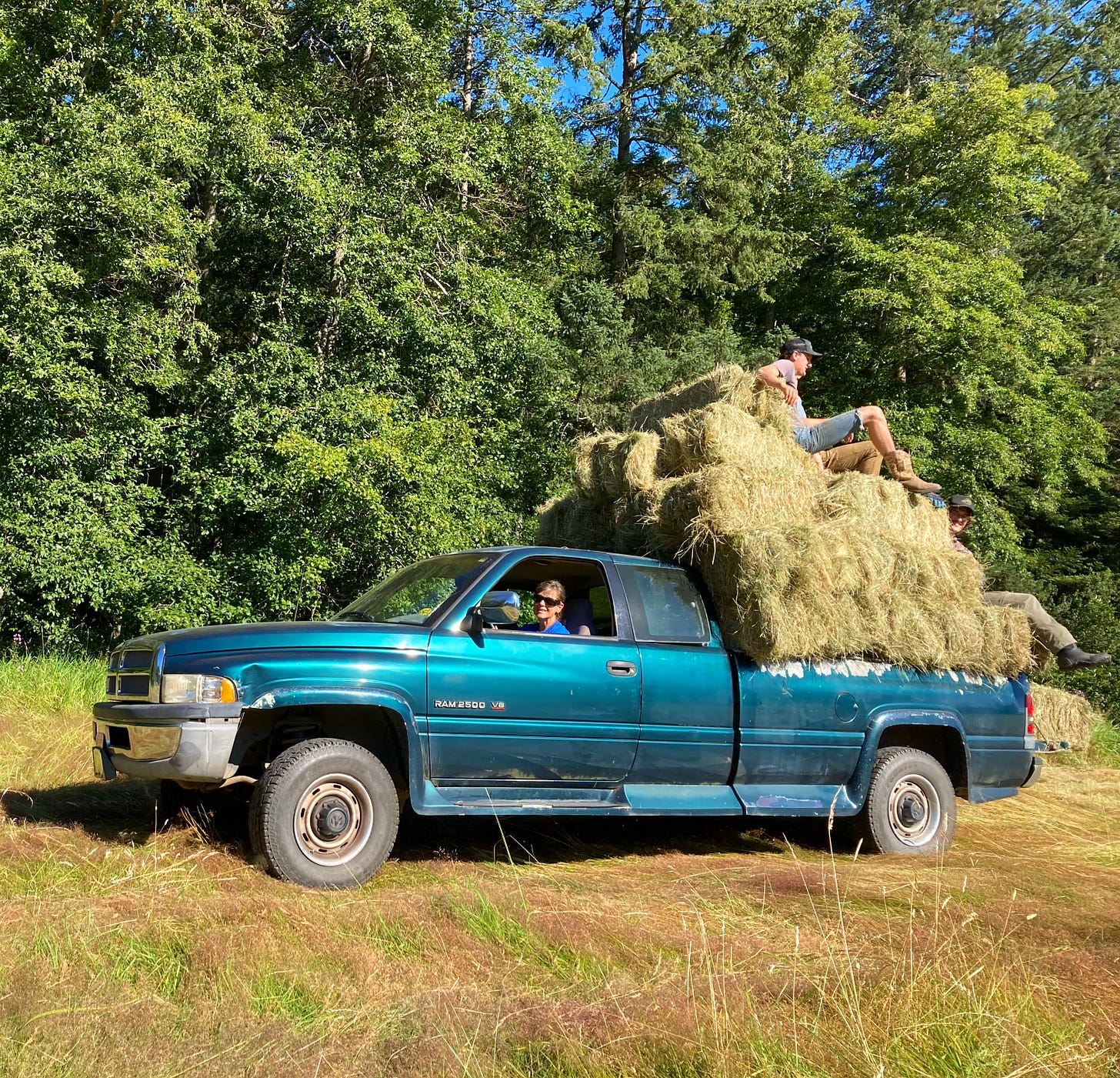Do you know anyone who might benefit from this newsletter? Please pass it along. You can literally forward it. Like it’s 2003. Or, there’s a button:
It is also now possible to support my work.
#
There is a version of debt that is beautiful.
Each August, as the grasses of Orcas reach their peak green, a remarkable dance takes place. I watched it last year from my little farm trailer.
A farmhand out of a Marlboro ad putters down the road in his 70s Ford tractor. Hitched to the back, a mower. I watch him mow neighboring hayfields. Then he returns with what I call the Spraddler.
Then he returns with a miraculous robot that I call the Hay Poopener.
And then, the dance begins. My farmer hosts knocked on my door one day and asked me if I’d like to buck hay. That sounded like a rootin’ tootin’ time so I said ‘ayup.
Bucking (throwing) hay into trucks and then into barns is a race against the weather. Rain can ruin hay (wet hay can ferment and burst into flames in a hayloft). So the island farmers mobilize to help each other gather and store hay bales before the next summer shower.
It is very physical work. Hay bales weigh 50-80 pounds. Sometimes you need to toss them high over your head. And while it is tempting to do the work in shorts and a t-shirt, hay can cause an awful itchy rash, so the wise cover up from head to toe.
I spent an exhausting and scorching few hours helping my hosts gather and pack away about 400 bales. In addition to their family, four neighbors came over to help, ranging from 20s to 60s.
After we were done, I stumbled back to my trailer to lie down. Then, much to my astonishment, my hosts took off to help their neighbors with *their* field.
No money changed hands. The debt of labor and camaraderie was repaid in kind. Islanders helped islanders. It was a virtuous closed loop. We beat the rains. And our critters had hay for the long winter. Everybody wins.
#
I’m carrying a decidedly unvirtuous type of debt, known as consumer debt. This means I owe about $20,000 in credit card debt to two banks. There is only one winner in this exchange; the banks. In the 10 years I amassed the debt and duly paid my minimums, I have calculated that I paid about $20,000 in interest.
A couple of years ago, I overcame my shame around my indebtedness and named a reality, which is that I simply could not pay off these debts.
So I stopped paying.
The banks responded initially with COVID-induced indulgence, offering me a three-month grace period. And then they began calling me, and mailing me, and Fedexing me:
>You seem to have overlooked your credit card bill. Please pay us or we’ll smash your credit.
>You seem to have overlooked your credit card bill for 180 days. We’ve smashed your credit and also pay us.
>We’ve charged off your debt. May God have mercy on your soul, and your credit.
As a red-blooded American consumer, I’d conflated credit death with actual death. Part of the reason why I’d paid minimum balances for a decade was because of the fear and shame of default. But after defaulting, I yet lived. And a peace came over me.
As the collectors called and mailed, I realized that they had no further power over me. They harrumphed and threatened and begged but I knew that it was all a show, so much saber rattling.
One of the nice things about being broke, and having no assets, is that I am what’s known as judgment proof. This means that legally speaking I am the stone, from which blood cannot be got.
Besides endless phone calls, the primary cudgel of the collection agency is the lawsuit. But what they know, and I know, is that a lawsuit would be expensive and fruitless for them. So the letters come in, from a succession of agencies (because they sell the debt to each other, another strange and ugly business).
I wish I was also judgment proof from my own judgments and those of others. Because I still feel shame about being broke and indebted. I recently read a damning article on the death of the American middle class. And the writer argued that the middle class is basically defined by their willingness to take on debt, and their easy access to credit. That term, consumer confidence? Willingness to take on debt to *buy*more*shit*
In all other ways the middle class is in decline. But the credit cards, the shiny consumables, are what they cling to for status. So yes, to cut up my credit cards, to shred my credit score, to buy with cash, was to give up on my middle class fantasy.
Reality check. I come from privilege by many measures. So my experience is not the same as folks who started at the bottom of the capitalism ladder (and shall remain there no matter how hard they work #structuralinequality #anticapitalistTikTok).
Also there are even more diabolical forms of debt. I’m looking at you, medical debt. And you, student debt. Also, long rant for another day: Why is student debt one of the only types of debt that is NOT covered by bankruptcy? Discuss.
#
One of the crazy things about the debt industry is the vast imbalance of power between creditor and debtor. This situation was exacerbated in 2005, with the Bankruptcy Abuse Prevention and Consumer Protection Act, which made filing for bankruptcy *more* difficult for individuals (presumably that’s the “abuse prevention.” Honestly who would file for personal bankruptcy unless they absolutely had to?)
Part of this imbalance is information. I’ve been astonished by how hard it is to find good information about debt. I’ve talked to credit counselors, bankruptcy attorneys, and have found out that nobody really knows the best course of action. For instance, nobody can tell you the precise credit implications of filing for bankruptcy. This is because the credit agencies (Experian, Equifax, the other one) are proprietary black boxes. They have enormous sway over our lives and yet their machinations are trade secrets.
A bankruptcy attorney suggested I direct my questions to Reddit (yes, really). So I swallowed my pride and wrote a post on a bankruptcy subreddit. And bless their hearts, a few people from the Internet chimed in. The advice was interesting, of sketchy provenance, and often contradictory.
I did notice in the forums a curious phenomena. A person would post a conundrum and then a few or a lot of people would chime in with advice (it helped to have a heart-tugging backstory). But then at least one guy (always a guy), would swagger in and offer this choice piece of advice:
I don’t get it, why don’t you just pay your debts? Where I come from you honor your debts. Go work harder and pay your creditors #yourewelcome
It’s rather like a guy bursting into an al-anon meeting and offering:
Hey you guys just stop drinking. Drinking is bad. So stop it. Meeting dismissed!
#
There is a story, a myth really, that bankruptcy is 100% about personal responsibility (and thus personal failure). But I look to the structure of society, and I call bullshit.
Witness the degree to which banks extend credit to unqualified borrowers (remember the housing bubble?) I myself was given a $22,000 credit line when I was making less than $40,000 a year. The general rule for bankruptcy, is that if your debts exceed 50% of your income, you should file immediately. Huh, interesting.
Witness the unequal access to capital, property, education, medical care, and other advantages #patriarchy #structuralracism #redlining #etc
Witness also the vast machine called advertising that manufactures an insatiable hole of not-enoughness in every consumer. Witness that the word consumer is a word we use without laughing or weeping.
Witness the not-enoughness, the material worldview, the collapse of human connection, the lie of social media, pulling the human spirit into immiseration. Witness the self-medication with, yes, buying things.
Witness the in-built precarity of the American dream. That any number of chutes can drop an American consumer into a tent encampment on I-5: loss of a job, medical crisis, family crisis…
Okay, back down to earth.
Here’s what I think happened to me.
I was living in a region of the country that is unsustainable for virtually all human beings (the San Francisco Bay Area). I was coping with unacknowledged complex PTSD, which limited my executive function, my ability to set goals, my ability to adjust to reality. I was living under a deeply unhealthy worldview, but one that I share with most westerners, that I was a separate human being and solely responsible for my success or failure. I was failing, by material measures, and leaned on credit increasingly for basic life expenses. As I began to spiral to collapse, my income dropped to less than $20,000 a year, and I financed a move, and a life on an expensive island, with my credit cards.
And then, at last, the music stopped. And here I am.
#
I’ve been strolling toward bankruptcy for about three years. In 2020 I hired a lawyer and proceeded to the point of almost filing with the court, but stopped. I’d heard about a methodology for settling, at steep discount, with creditors. I spent months strategizing (and procrastinating), until I found the strategy was actually unworkable.
I’m preparing to file again. The only thing that will die is my credit. I’ll have a 10 year negative mark on my reborn credit. And a permanent, public record of bankruptcy.
And my banks, they’ll be just fine.
OTHER NEWS
Squirrel town has been eerily quiet. The algorithm giveth and now it taketh away. The last 5 videos have failed to exceed 20,000 views, which is to say, they failed to leave TikTok orbit. Perhaps Squirrel soared too close to the sun, and was smote.
I made a sort of spoof commercial for Human Beings that was a particular dud. It seems that overly optimistic programming is a nonstarter with my audience.
I suspect this is due to the vagaries of the TikTok algorithm, whose mind, like the Abrahamic god, is unknowable. But based on inference and research, the algorithm seems to mainly be focused on how long a viewer engages with a given video. And it quickly silos the creator into a category, which it then broadcasts to a particular audience. So, mental health content, to people who desire mental health content.
There are many downsides to giving such power to an algorithm. Among them, the echo chambers of self-reinforcing content (conservative content for conservative viewers, etc.) And also the extremism element, in that these algorithms mathematically hunt for more edgy and extreme content until siloed viewers find themselves watching pro-anorexia videos, or vaccine conspiracy theories.
Mental health content on TikTok has different flavors. I’ve seen affirming content, trauma focused-content, and dystopian, misanthropic, #fml content.
What I want to do is sneak affirming, hopeful content into trauma and #fml content. The algorithm does not approve.
LINKS
>Squirrel models active listening as a kind of template conversation.
>Some friends sent me this San Francisco Chronicle article on the origins of the San Francisco Suicide Club, an anarchic art collective from the late 70s, early 80s. Briefly mentioned in the article, the follow-up club, the Cacophony Society. I was friends with members of the Suicide Club and Cacophony Society during my California days. And there I am in the photo of “Santa’s army.” I’ve previously written about Santa’s Little Secret Service.







